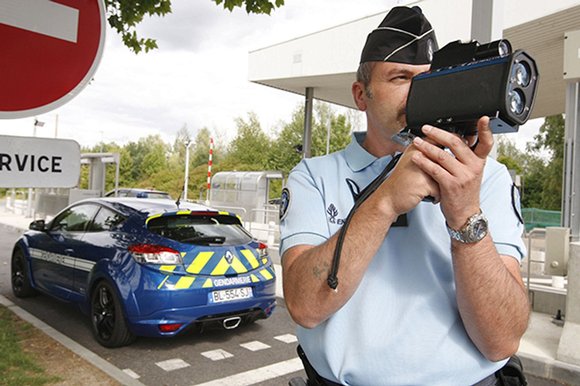EUROPEAN POLICE forces are to be given access to British drivers’ details so they can pursue fines for motoring offences committed on the Continent. It will be the first time that information, including a driver’s name, address and previous con–victions, has been made widely available to authorities outside the UK, writes Joseph Dunn.

Police officers in France have the power to impose on-the-spot fines for speeding.
The new law, being drawn up by the European Commission and due to come into force next May, will give police in 27 countries the power to demand British motorists’ details from the DVLA if they suspect an offence has been committed and has been caught on camera.
Offences include speeding, driving without a seatbelt and driving while using a mobile phone. Once the DVLA has received the demand and the car’s registration number, it will supply the registered owner’s name and address, allowing European police forces to send a penalty demand through the post. The letter will be written in English.
At the moment, British drivers can be fined for most offences in Europe only if they are stopped by an officer, who can issue an on-the-spot penalty. The new rules mean that speed and CCTV cameras can be used to capture the licence plate of the car, allowing police to trace its owner across the Channel. Parking offences are not covered by the new rules because they are not regarded as a road safety problem.
According to Brussels, the move is a response to concerns that foreign drivers were getting away with many offences when driving on the Continent. “This is the result of 10 years of frustration with blatant abuses of traffic laws,” said Helen Kearns, a transport spokesman for the European Commission. “Figures show that foreign drivers’ offences are relatively high and this measure is necessary to say: you can’t just get away with it.”
Police in most European countries have been sharing driver information since November 2013 under a European policing directive. Britain exercised its right to opt out of the directive on the grounds that the penalty notice applied to the registered owner of the car — so-called owner liability — rather than the person who was driving the vehicle at the time the offence was committed. Under British law, the driver at the time is responsible.
Earlier this month the European Court of Justice ruled that the law had been in–correctly drafted and should have fallen not under the policing directive but under the road safety directive, an area where Britain has no right to opt out. “Transport safety is part of EU rules where everyone is involved,” said Christopher Fretwell, a spokesman for the court. “There are no opt-outs. If re-adopted, it will apply across the board to member states.”
Some MEPs are furious that the directive will now be applied to British drivers: “The UK decided that on balance it was not in our interests to take part [in the previous law] because the directive prosecutes vehicle owners, rather than the offending driver, and it seeks to implement fines when other deter–rents — such as points on a licence — may be more effective,” said Timothy Kirkhope, a Conservative MEP who sits on the transport committee.
“If the commission brings forward a similar piece of legislation then we will oppose it when it reaches the European parliament.”
Experts say it is unlikely the legislation can be stopped since it would mean blocking the entire road safety directive. Foreign police forces have no powers to enforce the fine — that remains a matter for British courts — and British drivers could ignore the demand for payment. However, the next time they visited the country where the offence had been committed they would run the risk of being issued with an on-the-spot fine, or in extreme cases having their car impounded. British drivers issued with speeding fines in France have been escorted by officers to cash machines where they are expected to withdraw money to make the payment.
The new law could prove a boon for the Treasury, however: because it works both ways foreign drivers could be traced by British authorities. Although no official figures are available, the number of unpaid fines issued to foreign drivers runs into the millions. According to the most recent estimates, based on a survey of speed camera partnerships in 2012, an estimated 60,000 speeding fines worth £3.6m were written off because there was no effective way to track down foreign culprits.
This article originally appeared in The Sunday Times 'Drive' section Sunday 18th May 2014.
Blog submitted by: David at The French Property Network - Cle France.











